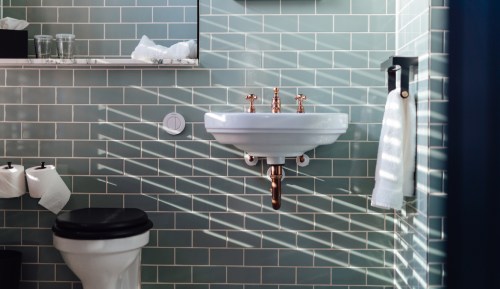They say another year older, another year wiser. But when it comes to how to pee correctly, it seems we’re all perpetual students of Water Closet 101. (Case in point: Every public bathroom, ever.) Over the years at Well+Good, we’ve collected an endless stream of tips for achieving what some call “the perfect pee”—and (you’re welcome) we’ve finally collected them all in once place.
Experts in This Article
doctor of physical therapy, owner of Femina Physical Therapy, and author of Sex Without Pain
board-certified urologist and founder of Prestige Medical Group in Santa Ana, California
Nicole Eisenbrown, MD, is a urologist who practices in Florida.
chief of urology and director of robotic and laparoscopic surgery at the Virginia Hospital Center
Below, you’ll find the hottest advice from urologists and pelvic floor therapists nationwide about being number one at going (I hate myself) number one. You’ll learn why you should stop power peeing, whether or not it’s actually necessary to squat in public restrooms, and the truth about relieving yourself in the shower. Mentally prepare yourself, because there’s sure to be some reality-shaking realizations ahead.
The 7 golden rules that will teach you how to pee correctly
1. Stop halting your flow mid-pee
You may have heard that taking a time-out mid-bathroom sesh will help you build stronger pelvic floor muscles. While true, that’s not what you want to be focused on when you’re spending time on the toilet. “When we void (pee), our bladder contracts, and our pelvic floor muscles reflexively relax. If you are peeing and trying to stop your flow, you are inhibiting a natural reflex your body needs to do,” Heather Jeffcoat, DPT, owner of Femina Physical Therapy in Los Angeles, previously told Well+Good. Over time, this may teach your pelvic muscles not to relax while you’re peeing (yikes), and keep you from fully expelling excess urine and bacteria in your flow (which could lead to a UTI). Long story, short: Save the kegels for your workout, okay?
2. Quit it with the power peeing
Apparently, the latest symptom of hustle culture is feeling like you need to pee at the speed of light in order to be classified as a productive person. This simply isn’t true, fam. “Our bodies have, over the millennia, evolved a highly sophisticated system for proper elimination of urine. This involves a complex neurological pathway that triggers the contraction of the bladder muscle with a coordinated relaxation of the urinary sphincter. Repetitive power peeing can disrupt this synchronized event and, over time, lead to a loss of bladder strength and proper sensation, culminating in poor emptying and the inability to appropriately discharge urine,” said Robert Mordkin, MD, FACS, chief of urology and the director of robotic and laparoscopic surgery at the Virginia Hospital Center in Arlington, Virginia. Take your time. Watch TikTok. Meditate. Treat peeing with the respect you would give a long number two session.
3. Follow the “20-second bladder rule” to monitor if you’re going number one often enough
Research shows that most mammals take 21 seconds on average to empty their bladders. In humans, this equates to releasing about 8 ounces (or one cup) of liquid. A person drinking the recommended eight glasses of water a day should then need to pee about eight times per day, urologist Nicole Eisenbrown, MD, told Well+Good. But if you’re not drinking enough (or too much), or you’re ignoring your body’s signals that it needs to pee, that timing gets thrown out of whack—and with it, the length of your, ahem, stream.
Enter the 20-second bladder rule to help you optimize your hydration and your pee habits. Peeing for more than 20 seconds might indicate that you’ve been holding it for too long; peeing for less than 20 seconds might mean you’re going to the bathroom too often. Knowing your current number can help you assess how much water you’re drinking, how often you hold it when you have to go, and other habits that affect your peeing (like learning which foods make your pee smell)—and make changes accordingly. Your bladder will thank you.
4. Pee in the shower if you feel like it
I don’t know when showers were invented, but I’d wager that people have been fighting about the practice of peeing in the shower at least since then. But in 2021, a urologist has spoken, and it’s completely okay to go number one while you’re getting clean. Just maybe ask your partner first if you’re having a rendez-vous in the shower.
5. Avoid holding your pee
Sometimes this can’t be helped (like being stuck in a middle seat on a plane), but overall holding your pee should be a rare occurrence. “Chronically holding in your pee can overstretch your bladder and lead to bladder muscle weakness,” Lamia Gabal, MD, a board-certified urologist, previously told Well+Good. Over time, this habit could lead to difficulty peeing, development of UTIs, or burning pee after sex or holding it in too long.
6. Also skip the “just in case” pee
On the opposite end of the spectrum, there is the “just in case” pee, or the pee you take when you’re worried about a dearth of bathrooms in the future. While I admire your foresight, urologists advise against it. “It can send a message to your brain that this is a correct volume for your bladder to have the sensation of needing to urinate, almost training your bladder to have to void at smaller volumes,” said Dr. Gabal. Put simply: Peeing too often will eventually cause your body to want to pee more often, and that’s likely not ideal for your schedule. However, if you are someone with urinary incontinence issues, the “just in case” pee is completely fine.
7. Sitting on public toilets is completely fine, seriously
Still squatting in the airline loo or public park toilet? Get ready: I’m about to free you of that burden. Earlier this year, we asked an infectious disease doctor, a urologist, and a pelvic floor expert if squatting is superior to just sitting, and they all answered with a resounding “no m’am.” “The act of squatting strongly engages and tenses the muscles of the groin and pelvic floor, which can potentially cause long-standing spasticity,” said David Kaufman, MD, director of Central Park Urology, a division of Maiden Lane Medical. In time, this can prevent you from fully emptying your bladder and increase your likelihood of developing a UTI. And cleanliness-wise, sitting on a public throne is really no different than touching your phone or turning the channel on your TV remote. (Hey, I’m just the messenger here.)
Oh hi! You look like someone who loves free workouts, discounts for cutting-edge wellness brands, and exclusive Well+Good content. Sign up for Well+, our online community of wellness insiders, and unlock your rewards instantly.
Sign Up for Our Daily Newsletter
Get all the latest in wellness, trends, food, fitness, beauty, and more delivered right to your inbox.
Got it, you've been added to our email list.











